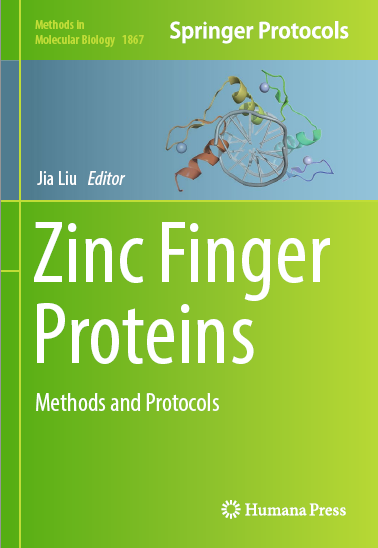ResearchAssociate Professor Jia Liu from Prof. Biao Jiang’s Laboratory of ADC Chemistryin SIAIS has completed editing the 1867 volume of Methods in Molecular Biology (MiMB) with a volume title of ZincFinger Proteins: Methods and Protocols. This volume of MiMB has been availablefrom Springer, Amazon and other booksellers.
TheMiMB book series wasfounded by the series editor John Walker in 1983. MiMB provides methods andprotocols in molecular biology and is well known for providing step-by-stepexperimental procedures. The first MiMB volume specialized on zinc fingerproteins (ZFPs) was edited by Prof. Joel Mackay and Prof. David Segal in 2010.Recent years we have seen notable progress on both the basic research and therapeutic applicationsof ZFPs. The new MiMB volume on ZFPs covers the methods and protocols ofcutting-edge ZFPstechnologies, providing thorough guidance for researchers in the ZFPsfield.
ZFPsare the most abundant transcription factors in eukaryotes, playing importantroles in a variety of biological functions such as DNA methylation, DNAtranscription, cell cycle, cell division, tumorigenesis and others. ZFPsbind zinc ions via cysteine and histidine residues and can be categorized into C2H2、C4 and CCHC type ZFPs according to different means of chelating zinc ions.Decades’ studies have deciphered the DNA recognition of ZFPs. Artificial ZFPsalong with the newly emerged TALE and CRISPR systems have been widely used ingene regulation and genome engineering fields. Recent studies also proved thatzinc finger nucleases, which contains ZFPs asthe DNA binding domain, are safe in human trials, shedding the light on thepotential of ZFPsfor biomedical applications.
ThisMiMB volume of ZFPs contains three parts consisting 19 chapters, covering thetopics on the basic biological functions, design of artificial ZFPs, evaluationof the cytotoxicity, delivery methods and others. This volume of MiMB willfacilitate both the basic ZFP researchand development of next-generation ZFPs therapeutics.




